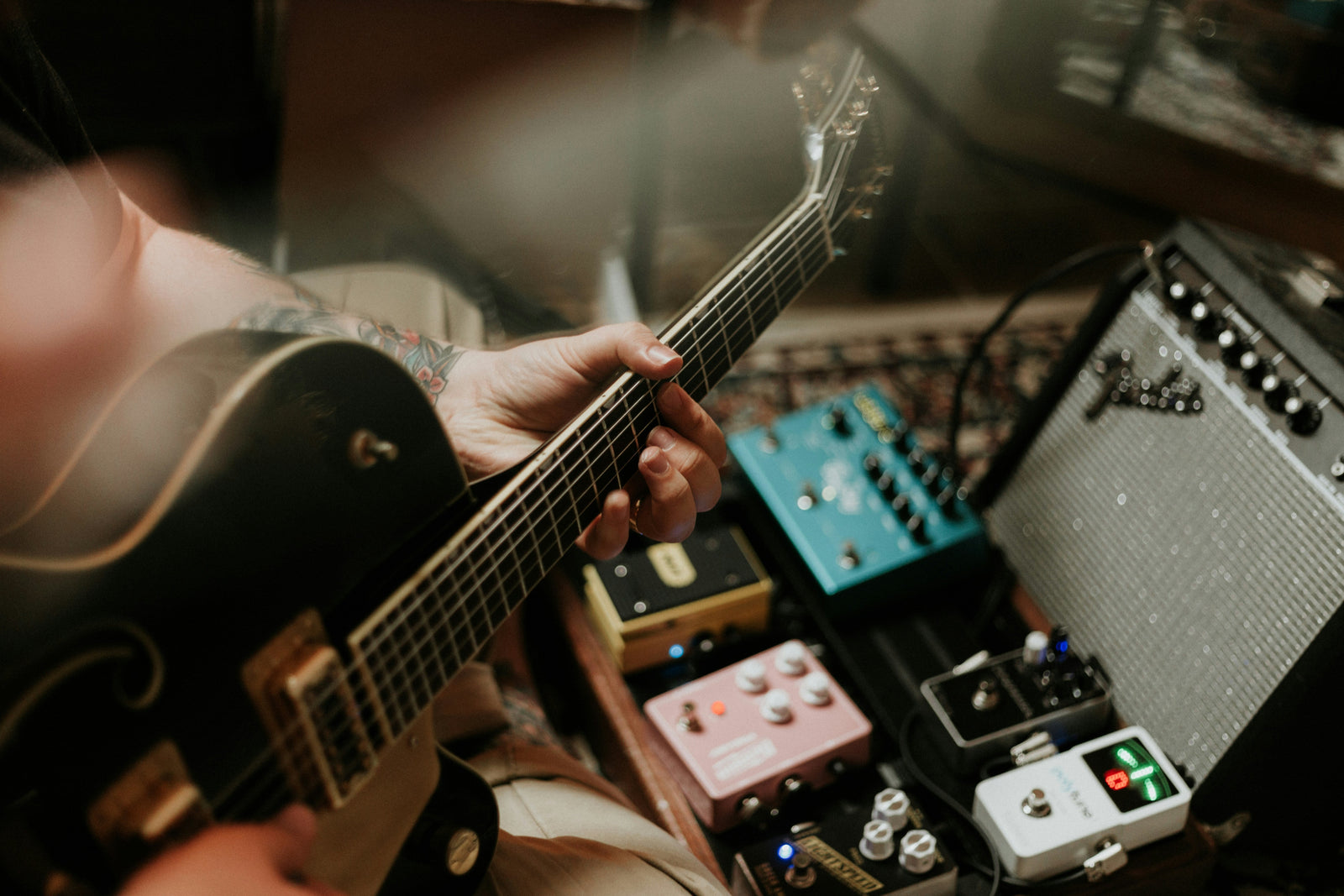String Guitar Tuner 101: The Complete Beginner's Guide
A string guitar tuner is vital for musicians to maintain accurate pitch. Proper tuning ensures each note sounds correct and enhances musical performance.
Guitarists often need a reliable tuner to keep their instruments in tune. Even experienced musicians rely on tuners to achieve the desired pitch. Consistent tuning is crucial before every practice session or live performance. Various tuning devices and technologies can help you achieve a perfect sound.
This guide will cover the basics of guitar tuners, brands, and common challenges. You'll also learn about alternative tuning methods to expand your musical range.
Discover how the right tuner can transform your playing experience.
What Instruments Use the String Guitar Tuner and How Many Strings Do They Have?
6-String Guitars
Most guitarists start with a standard 6-string guitar tuned to EADGBE. The six strings provide a full musical range, suitable for various genres. Electric and acoustic guitars use this tuning. A 6 string guitar tuner ensures each string is in perfect pitch. It makes playing more enjoyable.
The EADGBE tuning allows for chords, scales, and melodies across musical styles. Electric guitars, like Fender Stratocaster and Gibson Les Paul, often use standard tuning. Models like the Martin D-28 and Taylor 214ce are popular for acoustics.
6-string guitars play popular songs like "Wonderwall" by Oasis and "Sweet Child O' Mine" by Guns N' Roses.
12-String Guitars
A 12-string guitar features pairs of strings tuned together for a fuller sound. Players tune each string pair in octaves or unison. A 12-string guitar tuner helps maintain consistency across all string pairs.
The standard tuning for 12-string guitars is usually EADGBE, like a 6-string guitar. This tuning gives songs a rich, layered texture, popular in folk and rock music. Models like the Guild F-512 and Rickenbacker 360/12 have a unique 12-string sound. It has gained renown for it.
The rich, layered sound is ideal for folk, rock, and country genres. "Hotel California" by The Eagles and "Wish You Were Here" by Pink Floyd feature 12-string guitars.
Other Instruments
Other instruments also use string guitar tuners besides 6- and 12-string guitars.
Bass guitars often have 4, 5, or 6 strings tuned to EADG, BEADG, or BEADGC. A 4 string guitar tuner can help keep a bass guitar in perfect tune for any performance. Some electric bass guitars include the Fender Precision Bass and the Yamaha TRBX304.
Ukuleles come in four-string (GCEA), six-string, and eight-string versions. Some mandolins and banjos also use tuners for accurate pitch. Mandolins have 4 pairs of strings, while banjos have 4 to 6 strings. Guitar tuners can help keep all these instruments in perfect harmony.
Exploring Trends and Technologies in String Guitar Tuner
Types of Tuners
Clip-On Tuners
Clip-on tuners attach to the headstock and detect string vibrations. Their portability and ease of use make them popular among beginners. They work well in noisy environments, eliminating interference from background noise. Brands like BOSS and Korg offer accurate and affordable models.
Find out more about Guitar Tuner Clip-On Overview for comprehensive guidance and recommendations.
Pedal Tuners
Pedal tuners are widely used by gigging guitarists for their precision and visibility. They connect to the guitar via a cable and often have bright LED displays. Most models include a mute function, allowing for silent tuning between songs.
Discover the complete guide and recommendations on Guitar Tuner Pedals by reading further.
Rack Tuners
Rack tuners offer studio-grade accuracy and precision for professionals. They are usually mounted in a 19-inch equipment rack, making them ideal for studio setups. With advanced features like many tuning modes and strobe displays, they are reliable.
Dive into Guitar Tuner Rack-mounted Overview for a complete guide and recommendations.
Smartphone Apps & Online Tuners
Smartphone apps and online tuners have gained popularity due to their convenience. Apps like Fender Tune and GuitarTuna offer accurate tuning with built-in microphone technology. They can detect pitch variations and provide visual feedback for tuning adjustments.
We have prepared Guitar Tuner Online: Best Apps For Free for easier selection.
Learn more about Guitar Tuner Online: Best Apps For Free for a comprehensive guide and recommendations.
Latest Technology Trends
Polyphonic Tuning
Polyphonic tuning allows for tuning all strings together. It provides a quick overview of each string's tuning status. This technology saves time, making it a valuable tool for live performers.
Microtonal Tuning
Microtonal tuners support non-standard tuning systems used in various global music traditions. They allow for fine-tuning in microtones, expanding creative possibilities.
Strobe Tuners
Strobe tuners provide the highest level of tuning accuracy by using a strobe display. They detect minute pitch changes, offering precision of up to 0.1 cents. Musicians regard strobe tuners for their accuracy and reliability.
Technological advancements have made string guitar tuners essential for musicians at all levels. They are now indispensable tools. Choose a tuner that matches your style and needs to maintain perfect pitch every time.
Common Problems Encountered with String Guitar Tuner and Solutions
Maintaining Pitch Accuracy
Maintaining pitch accuracy is a common challenge due to external factors. Temperature and humidity can cause strings to expand or contract, affecting tuning. Aggressive playing or bending can also lead to pitch drift. Here are some practical solutions:
- Regular Tuning Checks: Use a string guitar tuner before and during practice sessions or performances.
- String Maintenance: Change strings from time to time, as old strings tend to go out of tune more.
- Environmental Considerations: Avoid exposing the guitar to extreme temperature changes or humidity levels.
Finding Reliable Tuners
Finding a quality tuner requires understanding the different types available:
- Clip-On Tuners: Attach to the headstock and are great for beginners.
- Pedal Tuners: Provide precision and are popular among gigging guitarists.
- Rack Tuners: Ideal for studio musicians needing high accuracy.
- Smartphone Apps & Online Tuners: Convenient for quick tuning.
Understanding Alternative Tunings
Alternative tunings like open D or drop C can present unique challenges:
- Open Tunings: This can cause string buzzing without proper setup. Adjust the string gauge and truss rod.
- Drop Tunings: May need heavier strings to maintain tension and prevent flabbiness.
- Experimenting with Tuning: Start with simpler variations like Drop-D before exploring more complex tunings.
A reliable string guitar tuner is crucial for keeping your guitar in perfect pitch. By understanding common problems and their solutions. You can achieve a more harmonious playing experience.
Exploring Alternative Tuning Methods Beyond Standard Tuning
Drop Tunings (Drop-D, Drop-C)
Drop tunings involve lowering the pitch of one or more strings. In Drop-D tuning, players tune the low E string down to D. This tuning is popular in rock and metal for its heavy, dark tone. Songs like Everlong by Foo Fighters and Heart-Shaped Box by Nirvana use Drop-D.
Drop-C lowers the low E string to C, providing an even heavier sound used in modern metal.
Open Tunings (Open E, Open G, Open D)
Open tunings allow for full chords by strumming open strings. In Open E tuning, players tune the strings to E-B-E-G#-B-E, creating an E major chord. Open G, tuned to D-G-D-G-B-D, forms a G major chord. Open D provides a D major chord with D-A-D-F#-A-D.
Keith Richards of The Rolling Stones often used Open G in songs like Honky Tonk Women. Joni Mitchell's "Big Yellow Taxi" and many blues slide guitar pieces use Open D tuning.
Other Tuning Variations
DADGAD Tuning:
DADGAD is a versatile tuning with a distinctive Celtic sound. Players tune the strings to D-A-D-G-A-D, creating an open Dsus4 chord. Jimmy Page used it in Kashmir, while Pierre Bensusan popularized it in folk music.
Nashville Tuning:
Nashville tuning replaces wound strings with lighter gauge strings. This setup creates a chiming sound like a 12-string guitar. It adds unique brightness when used alongside standard tuning.
Microtonal Tuning:
Microtonal tuning divides the octave into more than 12 notes. It enables smaller pitch intervals and allows exploration of non-Western scales. Advanced tuners offer microtonal settings for innovative musical expressions.
Exploring these alternative tunings expands creativity and sonic range. Experimenting with a string guitar tuner ensures accuracy across various tunings.
Conclusion: Finding the Right String Guitar Tuner for Your Needs
Choosing the right string guitar tuner is vital for maintaining pitch accuracy. Whether you play a 6-string, 12-string, or bass guitar. The accurate tuning makes a difference. Clip-on tuners are great for beginners due to their convenience and affordability. Pedal tuners offer precision for gigging musicians while racking tuners suit studio professionals. Smartphone apps and online tuners are perfect for quick checks on the go.
Explore different tuning methods to expand your musical creativity. Drop-D and Open G tunings are simple and effective for beginners. DADGAD and microtonal tunings add distinctive textures for advanced players. Whatever your style, use a tuner to keep your sound consistent.
Experiment with tuners until you find one that matches your needs and preferences. Stay updated with tuning technology to improve your skills and your playing experience. Happy tuning!





